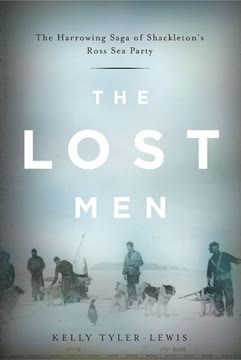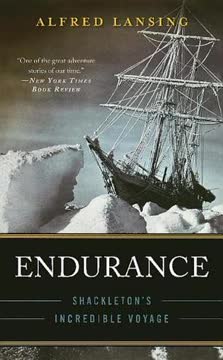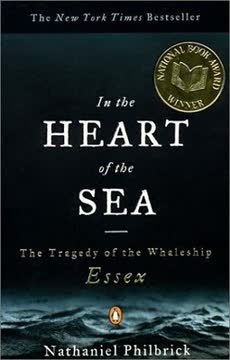Key Takeaways
1. The Unsung Heroes of Antarctic Exploration
In popular accounts of the Imperial Trans-Antarctic Expedition, then and now, they are overshadowed by Shackleton’s heroic exploits or excluded entirely, though it was not his intention to consign them to obscurity.
A forgotten saga. While Sir Ernest Shackleton's epic survival after the Endurance was crushed in the Weddell Sea captured global attention, the simultaneous, equally harrowing, and ultimately tragic story of his Ross Sea Party remained largely untold. This group of ten men, tasked with laying vital supply depots across the continent for Shackleton's planned trans-Antarctic crossing, faced immense challenges, isolation, and sacrifice, yet their contributions were historically overshadowed. Their mission was critical: without their depots, Shackleton's transcontinental journey would have been impossible.
The two-pronged plan. Shackleton's ambitious Imperial Trans-Antarctic Expedition (ITAE) involved two ships: the Endurance, which he commanded in the Weddell Sea, and the Aurora, destined for the Ross Sea. The Aurora's Ross Sea Party was to establish a chain of food and fuel depots along the final 360 miles of Shackleton's intended 1,500-mile transcontinental route, ending at Mount Hope at the foot of the Beardmore Glacier. This support was deemed "of supreme importance" for the main party's survival.
A testament to duty. The Ross Sea Party's story is a profound testament to human endurance and unwavering commitment to duty, even in the face of overwhelming adversity and the absence of their celebrated leader. Their selflessness, perseverance, and the extreme conditions they faced make their tale a compelling, yet often overlooked, chapter in polar history.
2. A Flawed Expedition's Perilous Start
“The ship was leaking all over; water poured from the deck into the cabins and hold,” he wrote to the expedition’s organizers in London.
Underfunded and unprepared. Mackintosh, appointed to command the Ross Sea Party and the Aurora, arrived in Australia to find the ship in a deplorable state, far from seaworthy after its previous Antarctic service. Shackleton, preoccupied with fundraising for the Endurance and facing wartime financial constraints, had purchased the Aurora sight unseen and provided woefully inadequate funds for its refit and provisioning. This forced Mackintosh into desperate, last-minute fundraising efforts in Australia.
Organizational chaos. The hurried preparations led to critical shortages and a chaotic departure.
- Ship Condition: The Aurora was leaking, rusted, and damaged, requiring extensive, costly repairs.
- Funding Shortfall: Only £1,000 was provided, far less than needed, forcing Mackintosh to mortgage the ship and seek donations.
- Missing Supplies: Essential sledging gear, clothing, and sufficient food for a two-year Antarctic stay were either missing or inadequate.
- Untested Crew: Many shore party members were inexperienced amateurs, and some key crew members were unreliable or problematic.
A secret change. Unbeknownst to Mackintosh, Shackleton had secretly decided to postpone his transcontinental crossing until late 1915, but the crucial "long cable" informing Mackintosh of this change was never sent. This miscommunication would have dire consequences, compelling the Ross Sea Party to rush their depot-laying efforts in the first season, believing Shackleton was already en route.
3. Marooned: The Aurora's Unforeseen Drift
“Fast in the pack and drifting to God knows where,” he wrote on May 9. “What of the poor beggars at Cape Evans and the Southern Party? . . . A dismal prospect for them.”
A sudden calamity. On May 6, 1915, a ferocious blizzard struck McMurdo Sound, tearing the Aurora from its moorings at Cape Evans. Despite Chief Officer Joseph Stenhouse's meticulous efforts to secure the ship, the immense pressure of the ice snapped her heavy cables "like cotton" and wrenched her free. The ship, with eighteen men aboard, was swept north into the vast, unpredictable pack ice of the Southern Ocean, leaving ten shore party members stranded at Cape Evans.
A desperate drift. For 312 days, the Aurora was trapped, drifting over 1,600 miles, battered by ice and storms.
- Rudder Smashed: The ship's rudder was violently torn away, rendering her unsteerable.
- Hull Strain: The hull groaned and buckled under pressure, leading to severe leaks.
- Wireless Failure: The wireless aerial was repeatedly damaged, cutting off communication with the outside world.
- Resource Depletion: Coal, food, and fresh water dwindled, forcing strict rationing and reliance on seal meat.
Uncertain fates. Stenhouse and his crew faced constant peril, battling to keep the crippled vessel afloat while agonizing over the fate of the marooned shore party, whom they believed might have perished. Simultaneously, the shore party, unaware of the Aurora's survival, resigned themselves to an indefinite, isolated existence, their hopes for rescue dimming with each passing month.
4. Duty Above All: The Depot-Laying Ordeal
When the Aurora disappeared with most of their clothing, food, and equipment aboard, the stranded men chose to risk their own lives for the sake of Shackleton, a man most of them had met only briefly, or not at all.
A selfless commitment. Despite being stranded with scant supplies and no hope of immediate rescue, the ten men of the Ross Sea Party made an extraordinary decision: to continue laying the supply depots for Shackleton. They believed his life, and those of his companions, depended entirely on their efforts. This commitment to a mission, even when their own survival was precarious, became their driving purpose.
Improvisation and hardship. The men scavenged Scott's abandoned huts for food, clothing, and equipment, improvising what they lacked.
- Clothing: Canvas tents were repurposed into trousers and outer boots; reindeer fur sleeping bags became inner boots and mitts.
- Gear: Damaged sledges were repaired, and lamp wicks were stitched into harnesses for man-hauling.
- Fuel: Seal blubber became their primary fuel source for heating and cooking, coating everything in greasy soot.
- Food: Their diet relied heavily on seal meat, supplemented by decade-old provisions from previous expeditions.
The grueling march. The second sledging season, from October 1915 to March 1916, was a 1,330-mile odyssey across the treacherous Ross Ice Shelf. Hauling heavy sledges (up to 232 pounds per man) through blizzards, deep snow, and hidden crevasses, they pushed their bodies to the absolute limit, driven by their unwavering sense of duty to Shackleton.
5. The Human Cost: Scurvy and Sacrifice
“We are all, more or less, suffering,” Hayward wrote.
The insidious grip of scurvy. Despite their efforts to consume fresh seal meat, the prolonged reliance on a deficient diet, coupled with extreme physical exertion and cold, led to widespread scurvy among the sledging party. The disease manifested with debilitating symptoms:
- Physical Deterioration: Swollen, bleeding gums; blackened, swollen limbs from internal hemorrhaging; joint pain; and unhealing wounds.
- Mental Decline: Lassitude, weakness, paranoia, and delirium.
- Hypothermia: Constant cold, wet clothing, and inadequate nutrition led to dangerously low body temperatures.
Tragic losses. The return journey from Mount Hope became a desperate race against time and the elements. Spencer-Smith, the expedition chaplain, succumbed to scurvy and hypothermia on March 9, 1916, just thirty miles from Hut Point, after being dragged on a sledge for days. Mackintosh and Hayward, both severely weakened by scurvy, later attempted to cross the unstable sea ice from Hut Point to Cape Evans in a blizzard on May 8, 1916, and were never seen again, presumed drowned.
A heavy toll. The expedition, intended to be a triumph of exploration, exacted a devastating human cost. Three men perished, and the survivors bore lasting physical and psychological scars from their ordeal, a stark reminder of the Antarctic's unforgiving nature.
6. Leadership Tested: Mackintosh's Decline, Joyce's Pragmatism
“I think the man must be mad to think it is possible to pull such a load in the conditions in which we are placed. Only one thing he thinks of that is the men at the other end but he won’t take good solid advice how to make good out of a bad thing.”
A commander's burden. Mackintosh, though brave and dedicated, struggled with the immense pressures of command. His inexperience in polar travel and his rigid adherence to Shackleton's unrealistic timelines led to early missteps, including overworking the dogs and imposing excessive loads on the men. He yearned for the support of a strong first officer and found it difficult to impose discipline on the civilian volunteers.
Joyce's pragmatic defiance. Ernest Joyce, the seasoned polar veteran, often clashed with Mackintosh over strategy, particularly regarding dog handling and sledge loads. While Mackintosh prioritized speed and adherence to the original plan, Joyce advocated for caution, rest, and lighter loads, often defying orders to ensure the party's survival.
- Dog Management: Joyce insisted on proper dog training and feeding, while Mackintosh's methods led to numerous canine deaths.
- Load Management: Joyce consistently argued for lighter loads, proving his point by achieving better mileage with his own team.
- Decision-Making: Joyce's pragmatism and field experience often proved superior to Mackintosh's theoretical plans, leading to a de facto leadership shift.
A complex dynamic. The tension between Mackintosh's formal authority and Joyce's practical expertise created a strained but ultimately effective dynamic. Mackintosh's physical and mental deterioration forced him to cede control, allowing Joyce and Richards to guide the party through the most perilous stages of the retreat.
7. A World Transformed: Return to War
“We had left the civilized world in 1914 with the rather naïve outlook that prevailed in the very early years of this century,” said Richards. “We returned in 1917 to a world that could never again be the same as before.”
A changed reality. The survivors of the Ross Sea Party returned to a world irrevocably altered by World War I. Their two years of isolation meant they had missed the devastating scale of the conflict, the millions of casualties, and the profound societal shifts. The "Great Adventure" of polar exploration now seemed trivial compared to the global catastrophe.
The war's shadow. The war had significantly impacted the expedition from its inception:
- Funding Challenges: Wartime priorities made fundraising difficult for Shackleton.
- Personnel Shortages: Key crew members were recalled for military service.
- Rescue Complications: The war diverted resources, making rescue efforts for both the Endurance and Aurora parties a low priority for governments.
- Public Perception: Heroism on the battlefield overshadowed polar exploits, leading to public apathy towards exploration.
A new purpose. Many survivors, feeling a sense of duty, immediately sought to enlist, only to find their health compromised or their skills less relevant in the mechanized warfare. The world they had left behind, with its Edwardian innocence and imperial ambitions, was gone, replaced by a grimmer, more pragmatic reality.
8. Enduring Legacy: Recognition for the Lost Men
“It was something that the human spirit accomplished,” he said. “It was something you tried to do.”
A delayed recognition. For decades, the Ross Sea Party's story remained largely in the shadows, overshadowed by Shackleton's more publicized Endurance saga and the overwhelming narrative of World War I. Their sacrifices and achievements were known within a small circle of polar enthusiasts but largely forgotten by the wider public.
The truth emerges. Over time, through personal diaries, memoirs, and dedicated historical research, the full extent of their ordeal and their critical role in Shackleton's expedition came to light. Richard Richards's modest book, The Ross Sea Shore Party 1914-17, and Ernest Joyce's more flamboyant The South Polar Trail, along with archival discoveries, helped piece together their harrowing tale.
- Polar Medals: Members of the Ross Sea Party were eventually awarded the Polar Medal, and Joyce, Richards, Wild, and Hayward received the Albert Medal for their life-saving efforts.
- Geographical Naming: Antarctic features were named in their honor, including Larkman Nunatak and Davis Station.
- Historical Reassessment: Historians and explorers increasingly recognized their mission as one of the most remarkable feats of endurance and loyalty in polar history.
A testament to the human spirit. The Ross Sea Party's story stands as a powerful testament to the human capacity for resilience, selflessness, and unwavering commitment to a cause, even when faced with unimaginable hardship and the ultimate sacrifice. Their "dogged endeavour in the face of great difficulties and serious dangers" ultimately secured their place as true heroes of the Heroic Age of Antarctic exploration.
Last updated:
Review Summary
The Lost Men by Kelly Tyler-Lewis is highly praised for its detailed account of Shackleton's Ross Sea Party. Readers appreciate the thorough research, compelling narrative, and insights into the lesser-known side of the Antarctic expedition. The book is described as gripping, well-written, and an excellent companion to other polar exploration literature. Many reviewers highlight the incredible hardships faced by the party and their remarkable achievements despite numerous setbacks. The book offers a balanced perspective on the expedition's leadership and challenges.
Similar Books
Download PDF
Download EPUB
.epub digital book format is ideal for reading ebooks on phones, tablets, and e-readers.







